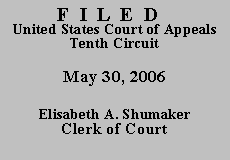

| JOSEPH D. JOHNSON, JR.,
v.
JOE ORTIZ; JOHN SUTHERS, The
Attorney General of the State of
Colorado |
|
Mr. Johnson was convicted, following a guilty plea, of first-degree burglary and first-degree assault, and sentenced to 12 years and 20 years respectively, to run consecutively followed by 5 years of mandatory parole. By way of background, on February 15, 2002, the public defender's office informed the trial court that Mr. Johnson's counsel was medically unavailable to represent him, and that another attorney, if appointed, could not be adequately prepared to try the case within the speedy trial period. The trial court informed Mr. Johnson that he had two options: (1) go to trial within the speedy trial time period but unrepresented; or (2) waive his right to a speedy trial and obtain new counsel.
Mr. Johnson initially indicated he would prefer the first option, but after being more fully informed regarding the difficulty of proceeding pro se by the trial court, Mr. Johnson chose to have representation, and waived his right to a speedy trial. The trial court accepted the waiver and appointed the public defender's office and another lawyer (advisory counsel) as co-counsel. The purpose of the arrangement was so that the public defender's office would take care of costs and an investigator. The public defender's office ultimately withdrew, but Mr. Johnson was represented by counsel through the plea agreement and sentence by advisory counsel who became trial counsel. Mr. Johnson filed a pro se motion to dismiss the charges because his right to a speedy trial was violated. The trial court denied the motion because Mr. Johnson was represented by counsel. Mr. Johnson then pleaded guilty to the two charges above in exchange for dismissal of the remaining charges against him.
Following his guilty plea, Mr. Johnson filed a Colo. R. Crim. P. 35(c) motion alleging ineffective assistance of counsel, a violation of his state statutory right to a speedy trial and that he was coerced into entering his guilty plea. His motion was denied by the trial court after an evidentiary hearing on certain claims, and the Colorado Court of Appeals affirmed that disposition. II R. Ex. D. The Colorado Supreme Court denied certiorari review. Mr. Johnson then sought federal habeas relief based on an alleged violation of his constitutional right to a speedy trial, which was caused by an alleged failure by the prosecution to keep a contractual promise purportedly underlying his waiver of speedy trial.
The district court adopted the report and recommendation of the magistrate judge, concluding that Mr. Johnson's speedy trial claim should be considered procedurally barred. On appeal, Mr. Johnson raises the same argument as below, viz., that he "was made a promise by the State Court that if [he] waive[d] [his] speedy trial right, [t]hat [he] would receive dual representation." Aplt. Br. at 2.
A federal habeas petitioner, like Mr. Johnson, must fairly present his federal claim to the state courts. 28 U.S.C. § 2254(b)(1)(A); Picard v. Connor, 404 U.S. 270, 275-76 (1971). On habeas review, this court will not consider issues that have been defaulted in state court on an independent and adequate state ground, unless the petitioner can demonstrate cause and prejudice or a fundamental miscarriage of justice. Coleman v. Thompson, 501 U.S. 722, 749-50 (1991). Indeed, a state procedural ground is independent if it relies on state law, rather than federal law, as the grounds for its decision. Hickman v. Spears, 160 F.3d 1269, 1271 (10th Cir. 1998). In order to find the state ground adequate, it must be "strictly or regularly followed" and "applied evenhandedly to all similar claims." Duvall v. Reynolds, 139 F.3d 768, 797 (10th Cir. 1998) (internal citations and quotations omitted).
We have reviewed the record in this case and conclude that it is not reasonably debatable whether Mr. Johnson fairly presented his federal claim to the state courts. He did notthe claim was that his state statutory right to a speedy trial had been violated, and that is the claim that the state courts decided. Mr. Johnson was required to argue his federal speedy trial claim in the state courts. As he has failed to do so, Mr. Johnson has procedurally defaulted this claim. Coleman, 501 U.S. at 731-32.
Of course, if Mr. Johnson can either (1) show cause for the default and actual prejudice as a result of the alleged violation of law;(1) or (2) demonstrate that a failure of this court to consider the claim will result in a fundamental miscarriage of justice, the procedural bar may be excused. Thomas v. Gibson, 218 F.3d 1213, 1221 (10th Cir. 2000). Upon review of the record in its entirety, we do not think that the district court's conclusion that Mr. Johnson failed to adequately show cause or prejudice, or a fundamental miscarriage of justice, is reasonably debatable.
Accordingly, we DENY a COA and DISMISS the appeal. We GRANT the motion for leave to proceed IFP, and DENY the petition for appointment of counsel.
Entered for the Court
Paul J. Kelly, Jr.
Circuit Judge
1. We note that an unconditional plea of guilty waives all non-jurisdictional defects including Sixth Amendment speedy trial claims. Tollett v. Henderson, 411 U.S. 258, 267 (1973); United States v. Andrews, 790 F.2d 803, 809 (10th Cir. 1986) (applying rule to federal Speedy Trial Act claims); see also Doggett v. United States, 505 U.S. 647, 657 n.3 (1992) (Sixth Amendment speedy trial claim preserved by a conditional guilty plea). Moreover, Mr. Johnson has not addressed prejudice from the standpoint of what a colorable speedy trial claim requires. See Barker v. Wingo, 407 U.S. 514, 530-33 (1972). Finally, Mr. Johnson's effort to show prejudice is undercut by the factual findings of the Colorado courts supporting their conclusions that Mr. Johnson received the benefit of his plea bargain, and that his plea was knowing and voluntary. II R. Ex. D at 8-9.